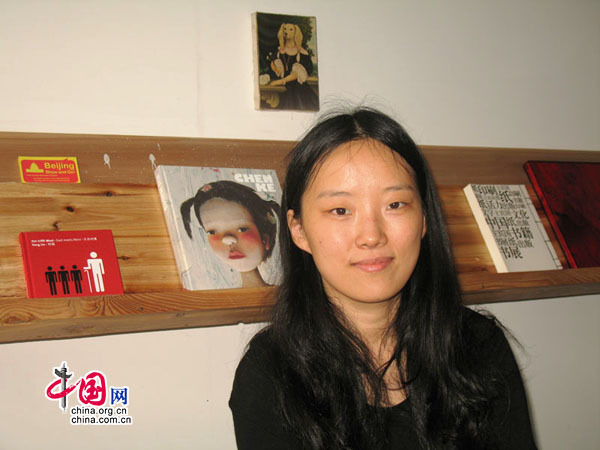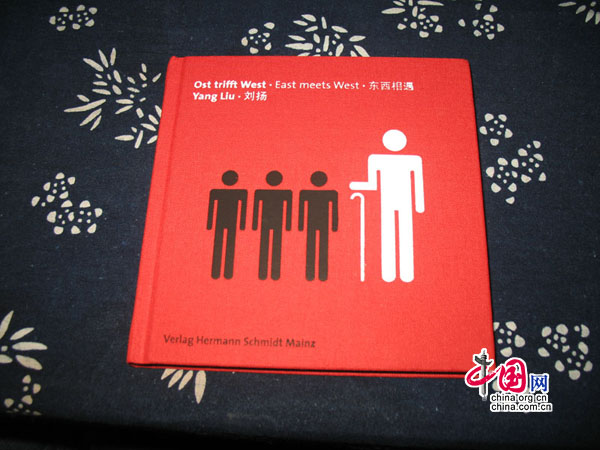By Till Woehler and Zhang Yue
Born in Beijing in 1976, Liu Yang moved to Germany at the age of 13. She graduated from the Berlin University of the Arts and in 2004 set up a studio in Berlin. In addition to designing the logo for 2009 Frankfurt Book Fair Guest of Honor China, Liu also designed CIPG's book From Oracle Bones to E-Publications. Familiar with both Chinese and German cultures, she shared with China.org.cn her views on cultural differences between the two countries, on September 7, 2009.
|

|
|
Liu Yang [China.org.cn] |
China.org.cn: As we are aware, German people prefer simplicity and utility, whereas Chinese people are fonder of romanticism and luxuriance. Many of your works show a strong European style and have won a lot of design awards in Germany. Have the prizes served to help or hinder the promotion of your works to Chinese audiences?
Liu Yang: I don't think my works are completely European in style. Simplicity actually reflects the highest level of Chinese art. My works are influenced by my personal experiences in various countries, [in cities] such as Beijing, Berlin, London, Singapore and New York. Some people have also had a great impact on me, like my former professor Holger Matthies and my colleagues in the New York studio. I also have a strong interest in Japanese design. All these elements make up my style. Prizes certainly help you gain trust from your clients, but it's not the most important thing in design.
China.org.cn: How did you find your first Chinese clients?
Liu Yang: It was like rolling a snowball. Sometimes I was referred by old clients, and sometimes people came to me after they saw my work.
China.org.cn: Which single design are you most satisfied with?
Liu Yang: Let me see...I guess it's a wedding card for a Beijing couple. It's small and very delicate. I was invited to their wedding.
China.org.cn: Let's talk about your large-scale designs. You designed the logo for China at this year's Frankfurt Book Fair; it has a red background with white Chinese characters. Can you explain the idea behind the design? Do you think German people understand its meaning?
Liu Yang: This work was well received at the press conference. The logo is made up of some key words from the book fair and printed like a traditional Chinese seal. The characters carry traditional Chinese culture through thousands of years of history, and their loose arrangement reflects modern Chinese culture. The logo can represent the image of China for both Chinese and German people. It also conveys other information. China has experienced a long history and is becoming a modern, open and innovative society. I chose to use red to represent traditional Chinese culture. Chinese culture has not yet been fully showcased on a world stage, and the book fair will be an excellent opportunity for this.
China.org.cn: As a vital player in promoting Chinese books abroad, CIPG has published a book called From Oracle Bones to E-Publications. You were in charge of the entire design of the book. How did you represent thousands of years of Chinese publishing history in your design?
Liu Yang: Generally speaking, my ideas came from the contents of the book. For this book, it was important to make a clear distinction between history and reality. The typeset of the historical part is simple. For the cover page I used a print of a modern relief sculpture. The style of the book is objective and stays close to reality, utilizing a dark color. I also used Plexiglas to decorate the book. The five colored ribbons will aid the readers and make the book more vivid. Cooperation with the author was really important in helping me find the most suitable design for the book.
China.org.cn: The style of the book is simplistic and traditional.
Liu Yang: Yes, it is. Simplicity is perfect for the historical subject matter of this book. My principle in designing the book was to use the design to serve the content.
|

|
|
Liu Yang's work "East Meets West" [China.org.cn] |
China.org.cn: Your work "East Meets West" in 2007 caught the eyes of Chinese netizens. In these designs you depict the differences in ways of thinking and handling daily affairs for Germans and Chinese. For example, Chinese senior citizens play with their grandchildren, while Germany's senior citizens prefer to walk their dogs. German women like a nice tan, while Chinese women strive for fair skin. What are your thoughts on this project?
Liu Yang: The designs have been exhibited 25 times, including in China. The reaction has been rather positive. At first I was worried that people would feel uncomfortable seeing such straightforward representations, but I was very happy to see that nobody was offended.
China.org.cn: What's your opinion about presenting China more vividly and accurately to the world?
Liu Yang: I think the official image is a little bit overcautious. There are so many restrictions that it's difficult to reflect the real state of the country. China could be more open. In fact, Chinese people are freer and more open than the official image presents. In many German people's minds, China is a place full of restrictions. It's not the reality. There is interesting art, music and cultural phenomena in many Chinese cities that are worth showing and promoting to the world.
China.org.cn: What you said is true. A lot of Germans in China have found that things are different from the preconceptions they had in Germany. As an international designer, what are your suggestions to better present China to the world?
Liu Yang: I think China should continue to loosen itself from rules and regulations; doing so would not detract from the nation's image. China is a fabulous country – both in tradition and culture, and it's a pity that that's not completely visible to the outside world. My suggestion is to showcase the role of tradition in modern Chinese society and the real lives of real people in China, especially the lives of those born in the 1970s, 1980s and 1990s. It would definitely shock the world.
(China.org.cn translated by Ren Zhongxi, September 16, 2009)